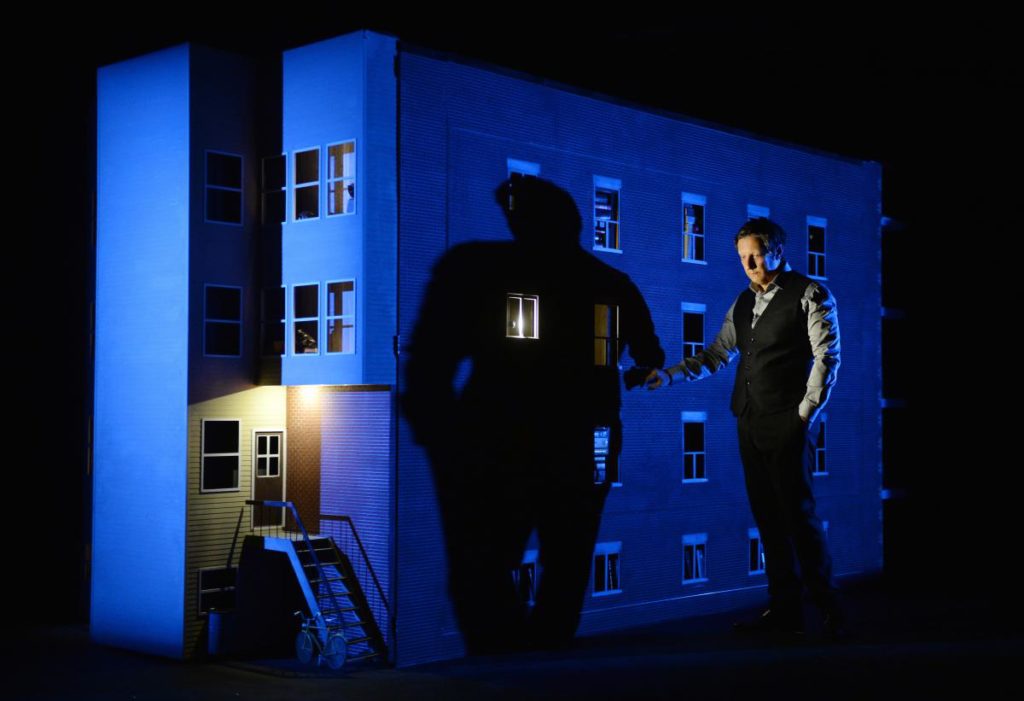887: a shared collective history about the nature of memory itself.

887 Playwright, Designer & Director Robert Lepage
Like pinpoints of light scattered across the map of shows I have attended over thirty years, a Robert Lepage production always stands out as something special. His reach into the subject matter of any endeavor he conceives, develops, and then as much as embodies as performs, triggers all the receptors in the theatrical brain.
In 887, Lepage re-creates a past that is intimately his own, and yet also a shared collective history. This isn’t just a memory play, so much as a play about the nature of memory itself. Recalling the past in 887 requires looking through the windows of time – literally – to replay the quaintest of recollections, and then pulling back to place these people and circumstances in the larger picture of Quebec and Canada. 887 is about why it is so important to remember, while at the same time reminding us that the ability to do so is a fragile, unique gift that may itself be slipping away. Just as a burst of fireworks blossoms onstage into dancing neurons and then dissolves into dispirit threads, our memories may also fragment and recede. Picture it while you can. The past is also – too often – a forgotten country.
In 887, the Canada of the 1960s and 70s stands on either side of the gulf between its two solitudes. We are not one people. From the grandly framed oil painting of the Battle of the Plains of Abraham, to the visit of Charles de Gaulle and his clarion cry of “Vive le Québec Libre”, cleverly re-enacted, Lepage uses archival images to advantage, capturing key moments of significant cultural shift.
887 pulls us into intimate spaces delicately illuminated by long ago spirits, and then widens the viewing lens to encompass the panorama and parades of political figures that shaped a nation and two cultures. This is theatre as alchemy, a transformation of soul into story.
The cleverness of the scenic design and staging is unsurpassed. From the fundamental magic of casting shadow puppets on a sheet, back-lit by a flash light in a child’s bedroom, to the live filming of a scene by a drone camera that glides on stage and records an eerie encounter in real time, the energy and imagination of Lepage and his extraordinary creative team knows no bounds. And yet, they stay within defined borders, always focused on the story, the people, and the transformation of the storyteller by the tale he tells. Characters spring to life by simply being invited to the stage, and we watch as invisible beings become amusingly present, in spirit if not in substance. Our pasts are full of ghosts.
In sharing his memories of his family, his father in particular, Lapage deftly makes his youthful world ours. And yet, the sharp lines of difference between French and English, privileged and poor, contented and discontented, are boldly drawn and unapologetically re-created.
“Speak White”, says Michèle Lalonde’s 1968 poem, the text that initially launches Lepage through time. “I’ll try to stay focused”, he also reassures us, though in his digressions we find beauty, poignancy and humour. Yes, despite the introspection, or perhaps because of it, Lepage is genuinely funny! His self-deprecating and suavely delivered humour is a delight. Off-handed sideswipes at the technologies that rule our lives are comedic, clever and insightful. Is our memory becoming something separate from ourselves, a thing we store and carry around? And if so, what are the consequences for the rich tapestry, the library and catalogue of our unique existences as we reach the age of trying to remember things past. Will those of us without cell phones be the last generation to truly remember?
887 is beautifully enhanced by the soundscape of Jean-Sébastien Côté and lighting design of Laurent Routhier. Further, Félix Fradet-Faguy, Image Designer, Steve Blanchet, Creative Director, and Ariane Sauvé, Associate Property Designer, occupy roles indispensible. The blending of all these crafts, the interplay of image and sound, of film clips and miniature figures, the juxtaposition of a multitude of special effects, and the overall interweaving of technology to craft this most human of shows, all contribute to a rare and wonderful production.
Robert Lepage’s Ex Machina has been presenting exceptionally entertaining and original shows for over three decades. I still remember being so vividly impressed by The Dragons’ Trilogy on stage at the Factory Theatre, Toronto, when it toured in the late 1980s. If you have not yet caught a performance by Lepage, 887 at the National Arts Centre should not be missed. If you have experienced his work before, you already have your ticket.
Superlatives asides, it’s a lot of fun. Go see it!
887 plays at the National Arts Centre in the Babs Asper Theatre until January 27.
Written, designed, directed and performed by Robert Lepage.
An Ex Machina Production (Québec).